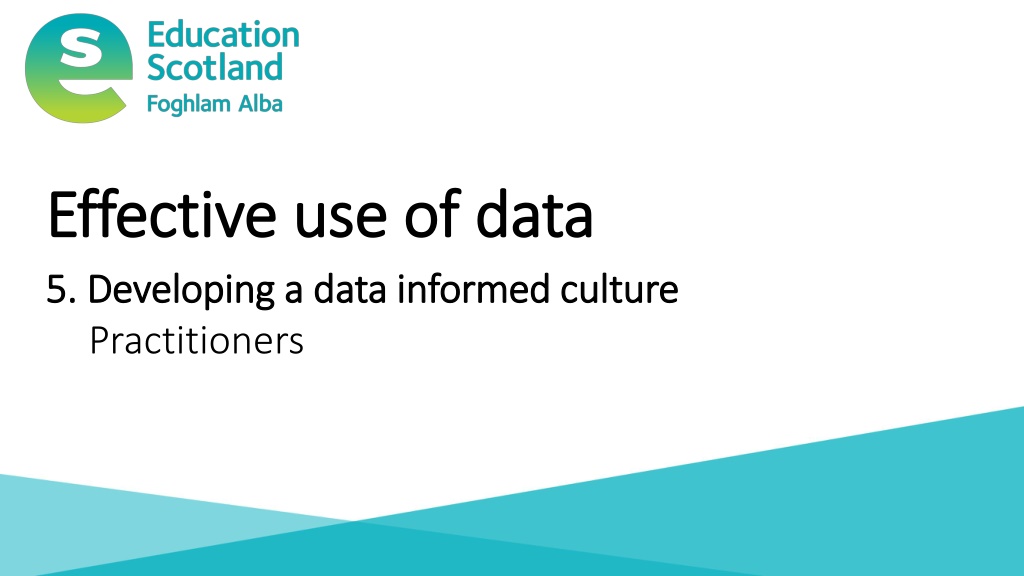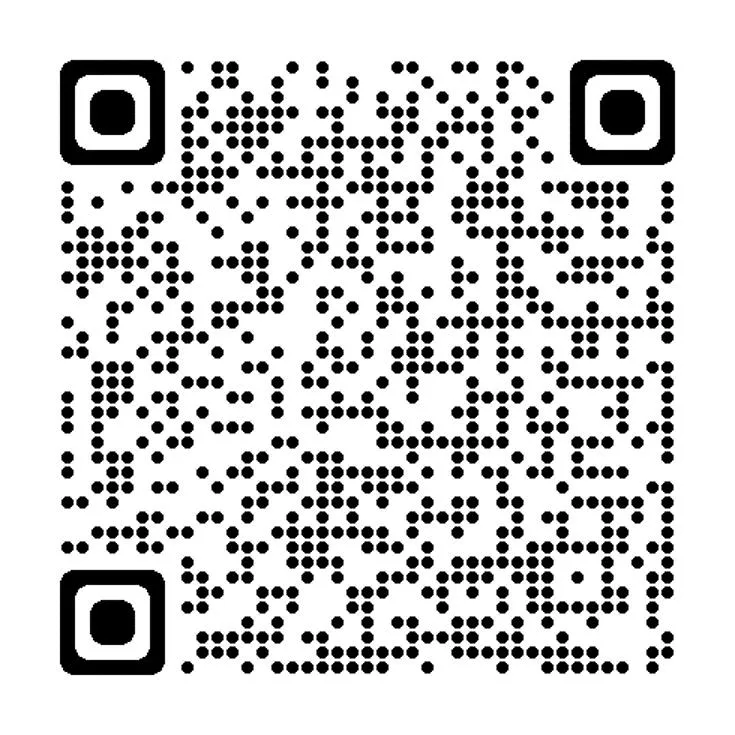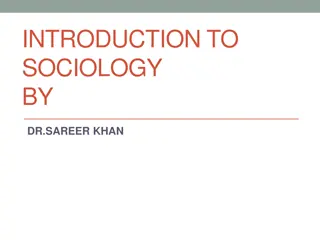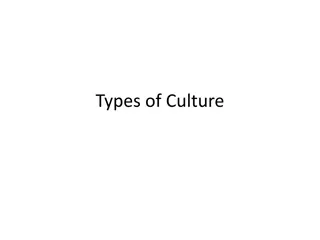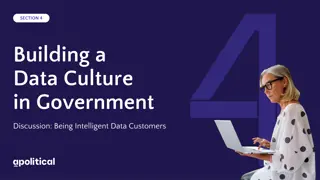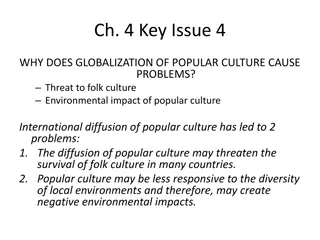Cultivating an Effective Data Culture: Strategies and Insights
Explore the key elements of developing a data-informed culture through national guidance, research insights, and practical considerations. Learn about creating a safe space for collaboration, effective data systems and processes, and the impact of a positive culture on teaching and learning. Gain valuable strategies for improving data utilization and fostering a culture of continuous improvement.
Download Presentation

Please find below an Image/Link to download the presentation.
The content on the website is provided AS IS for your information and personal use only. It may not be sold, licensed, or shared on other websites without obtaining consent from the author. Download presentation by click this link. If you encounter any issues during the download, it is possible that the publisher has removed the file from their server.
E N D
Presentation Transcript
Effective use of data Effective use of data 5. Developing a data informed culture 5. Developing a data informed culture Practitioners
The national model of professional learning The national model of professional learning The national model of professional learning | Professional Learning | Education Scotland
Draft Group Agreement and Protocols Draft Group Agreement and Protocols Work together Learn from, with, and on behalf of each other. Create a safe space to share ideas and build learning. Agree that everyone is an equal and valued participant. Remain in the room (emails and phone protocol)
Connector Connector In groups/pairs share a good book recommendation. It can be something you have read recently or an all-time favourite. Please share the name of the book and a brief explanation of why you enjoyed it.
Re Re- -cap cap In workshop 1 we looked at the purpose and use of data including: the meaning of data and evidence, the ways in which data is used and what we mean by big and small data. In workshop 2 we considered different categories of data and how these may be intersected to support improvement. In workshop 3 we looked at the importance of developing effective data systems and processes. In workshop 4 we looked at ways to analyse data from a range of sources including contextual, attainment and comparator data.
Aims Aims In this workshop we will consider: national guidance and research, what an effective data culture may look like, key considerations when developing a positive data culture, and improving a data culture scenarios.
Content coverage Content coverage National guidance and research Defining a positive data culture Key considerations Scenarios activity Reflection and feedback
Culture quotes Culture quotes It s a butterfly effect. In positive cultures, the most effective teachers talk to each other about teaching, learning and assessment. In a healthy school culture, data is information, not condemnation. Anthony Muhammad Sir Tim Brighouse When a culture is strong people work with each other for each other. A culture is weak when people work against each other for themselves. My definition of a good culture is just one that is consistent between what it thinks, what it says and how people act. I think the frustration and dissatisfaction most people have is from inconsistency. Simon Sinek Bob Glazer
GTCS Standard for Full Registration and Career Long GTCS Standard for Full Registration and Career Long Professional Learning Professional Learning Curriculum and Pedagogy 3.1.1 - Plan effectively to meet learners needs 3.1.4 - Effectively employ assessment, evaluate progress, recording and reporting as an integral part of the teaching process to support and enhance learning. Professional Learning 3.3.2 - Engage in reflective practice to develop and advance career-long professional learning. GTCS The Standard for Full Registration GTCS - The Standard for Career-Long Professional Learning
HGIOS HGIOS 4 4 Staff make effective use of current available data on levels of child poverty and apply this to ensure equity (1.5) All teachers have well-developed skills of data analysis which are focused on improvement (2.3) We use data to evaluate the effectiveness of interventions designed to improve outcomes for all learners (2.3)
Rapid Evidence Review Paper Rapid Evidence Review Paper Section five of the Education Scotland Rapid Evidence Review on developing a data informed culture highlights that: It is vital to provide time for collaboration and discussion around data. Foster a high challenge, low threat approach to data. It is important that data for improvement is understood and utilised at all levels. Clear policies, frameworks and governance can help to clarify roles and expectations.
What is a positive data culture? What is a positive data culture? A culture is often defined as the attitudes, beliefs and practices of a specific group of people / organisation. A culture is also about behaviours. Let s consider what a positive data culture might look like in schools / educational settings. What would it look like? What would it feel like? What sorts of things would happen?
Clear and consistently applied policy and guidance Clear and consistently applied policy and guidance Establishing clear policy and guidance around data use, systems and processes can help to ensure consistency and clarity. You may wish to consider: o Do we have access to clear and accessible guidance/policy around the use of data? o Are we aware of how and when we use data during different parts of the improvement cycle? o Do we know how or where to access support? o If guidance is in place are we applying it effectively?
Clear and consistently applied policy and guidance Clear and consistently applied policy and guidance part 2 part 2 This slide is a place holder for facilitators to consider adding in any local authority links to guidance or policy around data. This slide can be added to or removed as appropriate.
Policy and guidance improvement hub case study Stirling s Excellence and Equity Strategy | Resources | National Improvement Hub (education.gov.scot)
Clear roles and responsibilities Clear roles and responsibilities It is important the whole staff, learners, partners and families are aware of the way in which data is used and their roles and responsibilities around it. Levels of knowledge, skill and engagement may vary between roles, but it is important to establish that data is everyone s business. We all have the responsibility to collect, analyse and develop actions around the data. Data and evidence are only impactful if everyone is engaged. Improvement is often most directly influenced by those working closest to the learner.
Training and development Training and development As a staff we need: opportunities to reflect on our existing beliefs and practices and be challenged in a non-threatening manner, interactive training experiences, with opportunities for active learning through observation, meaningful discussion and reflection, demonstration of skills, deliberate practice, and feedback. structured support to help us apply our learning, to feel comfortable seeking support and guidance.
Meaningful collaboration and dialogue Meaningful collaboration and dialogue The Sutton Trust produced a report in 2015, on Developing Teachers . It highlights that professional collaboration benefits all and leads to innovation and creativity . When thinking about fostering positive data dialogue and collaboration, it may be helpful to consider whether: o as a staff we engage in formal or informal collaborative discussions, analysis and planning involving data or evidence, o leaders are modelling informal and formal data discussions, and if o we look outwards and seek to collaborate with other schools to improve our understanding and use of data.
An embedded and joined up approach An embedded and joined up approach In an effective data culture, the use of data and evidence is embedded throughout all areas of the improvement cycle. Data and evidence are used to plan, track, monitor and evaluate improvement at whole school and classroom level. Informal and formal data discussions take place between educators who feel challenged but psychologically safe. They openly share and are curious about data. All stakeholders understand the role of data and evidence in school and their part in utilising it effectively. The use of data and evidence is part of normal everyday activity.
An embedded approach An embedded approach signposting to tracking and signposting to tracking and monitoring guidance. monitoring guidance. Resources to support effective tracking and monitoring | Resources | Education Scotland
Data culture challenges activity Data culture challenges activity B. As a staff we collect a lot of data but are sometimes unsure of the purpose of collecting some of it. A. Data is viewed as the role or domain of the leadership team. C. Learners, families and partners are not involved in data. F. Data is gathered and analysed but it is not used to effectively improve outcomes planning, ongoing tracking and evaluation. E. We feel as if we have a lot of data but are unsure how to use it data paralysis. D. Data systems and processes are unreliable, inconsistently used or inaccurate.
Aims Review Aims Review In this workshop we will consider: national guidance and research, what an effective data culture may look like, key considerations when developing a positive data culture, and Improving a data culture scenarios.
Reflection activity Reflection activity Area 0 1 2 3 4 5 Actions? Clear and applied policy and guidance Effective data training and development Established roles and responsibilities Regular collaboration / data dialogue opportunities High challenge and low threat environment psychological safety around data Data and evidence is embedded in everything we do being data informed is the norm for all staff.
Feedback Feedback Insert you own evaluation code here
